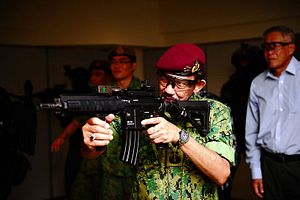This week, Brunei’s new military chief made his introductory visit to Singapore, which has been one of the sultanate’s closest defense partners. The trip, which came just months after his appointment to his new position was officially announced in February, reinforces bilateral defense ties amid a series of domestic and regional developments affecting the two countries.
Singapore and Brunei have long had a close defense relationship as part of their broader bilateral ties. This is reflected not just in traditional aspects like exchanges, visits, and exercises, but also the fact that the Singapore Armed Forces (SAF) holds training in Brunei, as it does with several other countries including Australia and the United States (See: “Where are Singapore-Brunei Defense Ties?”).The defense relationship has seen some recent gains over the past few years, with steps such as the inking of a new memorandum of understanding on defense technology cooperation, which expanded collaboration.
Those interactions have continued on in 2018, amid some domestic and regional developments affecting the two countries. Singapore is holding the annually rotating ASEAN chair this year, which has kept it busy on the foreign policy side even as it addresses a whole other range of priorities at home and abroad. Brunei, meanwhile, has had a busy few months domestically as it sets out priorities for the next few years amid significant economic challenges. The defense side has not been immune from this, and recent changes were announced earlier this year which included the appointment of Major General Pengiran Dato Seri Pahlawan Aminan bin Pengiran Haji Mahmud as the country’s new military chief in February (See: “What’s Behind Brunei’s New Defense Hike?”).
From April 2 to 4, Aminan made his first trip to Singapore in his current capacity. The trip saw him meet with a range of Singapore officials, including Defense Minister Ng Eng Hen and Chief of Defense Force Melvyn Ng.
Both sides discussed issues related to bilateral defense ties but also broader regional and global issues. According to Singapore’s defense ministry (MINDEF), Brunei also offered support for Singapore’s chairmanship of the ASEAN Defense Ministers’ Meeting (ADMM) and the expected deliverables. As I noted while at the Shangri-La Dialogue in Singapore last year, there are several notable proposals in this regard, including guidelines on air encounters between military aircraft (See: “Singapore Unveils New ASEAN Defense Initiatives Ahead of Chairmanship”).
Aminan also visited some of Singapore’s military facilities, including the Unmanned Aerial Vehicle (UAV) Command at Murai Camp, the 194 Squadron, the Information Fusion Center (IFC), and the Changi Regional Humanitarian Assistance and Disaster Relief Coordination Center (RHCC) at RSS Singapura-Changi Naval Base. Both the IFC and RHCC have played important roles as part of the broader, evolving security architecture in the region and Singapore’s contributions in this respect.





























